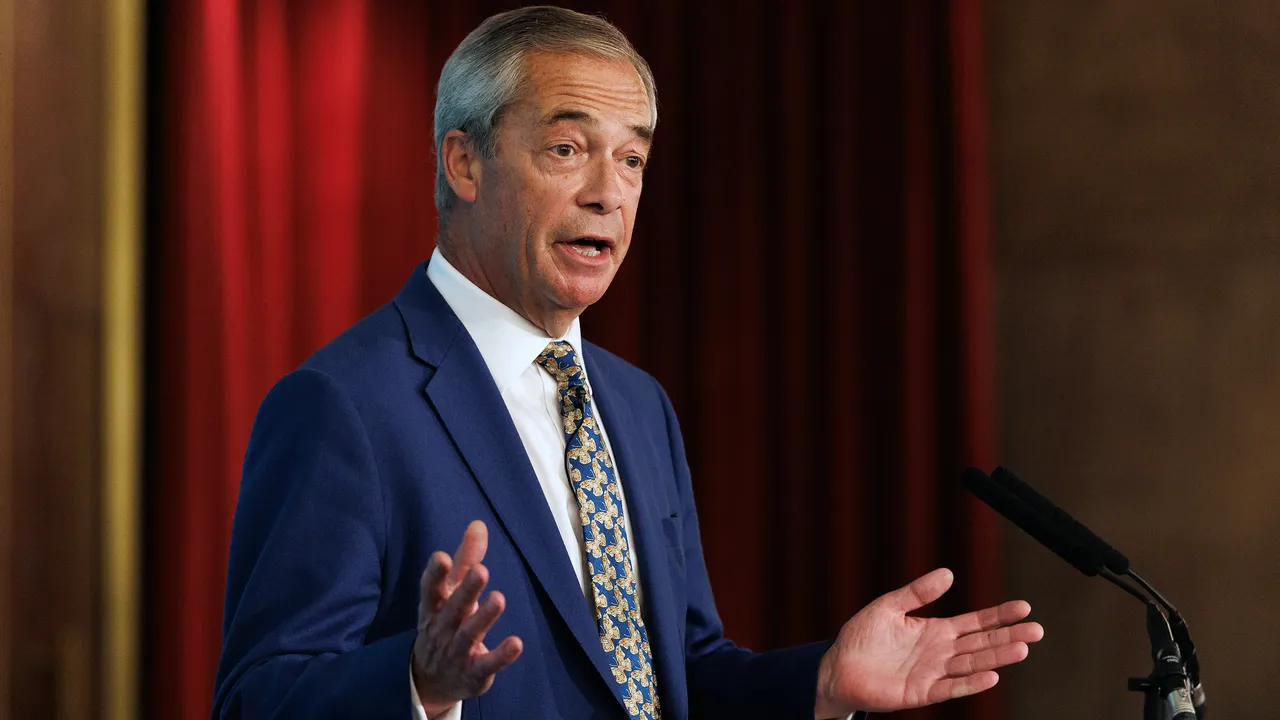
Nigel Farage’s Reform U.K. Party—the latest incarnation of the right-wing, anti-immigrant political movement that he has led for twenty years—has been atop the British polls for the past six months. It is currently polling at thirty per cent, ten points ahead of the Labour government. If there were a general election tomorrow, there is a plausible chance that Reform would win hundreds of seats in the House of Commons; that the duopoly of Labour and the Conservatives, which has ruled British politics for a century, would be broken; and that Farage, once nicknamed Mr. Brexit by his friend Donald Trump, would be Prime Minister.
There are plenty of sane, sensible arguments for why this won’t happen. For one thing, according to the law, there doesn’t need to be a general election until the summer of 2029. But British politics haven’t been sane or sensible for a long time—since Brexit, really, the last time that Farage jolted the country’s traditional two-party system off the rails. So, instead of looking upon the rise of Reform with resolve or equanimity (the Party currently has five members of Parliament, less than one per cent of the total), everyone is losing their mind. Whether out of shock, revulsion, or genuine affection—according to the polling firm YouGov, Farage is the most popular politician in the country—all that anyone can talk about is the unthinkable possibility of a Reform government, thus making it more thinkable by the day. The political center, occupied by Keir Starmer’s Labour Party and what remains of the moderate wing of the Conservative Party, is the most morbidly mesmerized of all. Watching mainstream British politicians obsess over the threat of Farage is a bit like watching the video on the internet of the guy standing motionless on the beach in Thailand, the water draining around his ankles, waiting for the tsunami to arrive.
Farage, who is sixty-one, doesn’t need the help. He is already the country’s most capable politician by a mile. Earlier this month, I went to see him speak at a Reform Party conference in Birmingham. Britain’s main political parties generally stage conferences in the fall, to debate policy, raise funds, and gird themselves for the parliamentary year ahead. In Reform’s case, the gathering felt more like a celebration: the culmination of a long summer of Farage-led stunts, interviews, and speeches that had successfully bored their way into the nation’s brain.
The Party’s messaging isn’t subtle. In July, while Parliament was in recess, Farage had staged a Lawless Britain campaign, during which he claimed, variously, that people were afraid to walk the streets of London after 9 P.M.; that “droves of unvetted men,” a.k.a. asylum seekers, were loose in the country, posing a threat to women and girls; and that crimes such as shoplifting and cellphone theft now go unpunished by the police. Parts of the country, Farage warned, were facing “nothing short of societal collapse.”
The following month, Farage announced Operation Restoring Justice, Reform’s plan for the deportation of six hundred thousand illegal migrants. Caught on their heels, neither Labour nor the Conservatives particularly objected to Farage’s diagnoses of Britain’s problems, just his methods for addressing them.
The conference in Birmingham was branded “The Next Step,” and you could buy turquoise-and-white Reform-branded soccer shirts with “29” on the back (indicating victory in 2029), for forty pounds each. Up close, you are reminded how thin and gimmicky the Party still is. (Reform was formed in 2021, when Farage rebranded his previous electoral vehicle, the Brexit Party.) A lot of the conference booths in Birmingham belonged to blockchain or crypto businesses. The most eye-catching display, reaching upward to the conference-hall ceiling, was for Direct Bullion, a gold dealer, decorated with pictures of Farage clutching a gold coin.
And yet Reform possesses something that Britain’s traditional political parties can only dream of. “It was weird to be at a party conference at the moment where people were happy,” Luke Tryl, the executive director of More in Common U.K., a think tank, founded in 2016, that explores political polarization, told me. As in the U.S., Tryl observed, the main fault line currently running through British politics is not to do with left or right but with whether voters feel pro- or anti-system. He said that More in Common’s most revealing research question for understanding the British public was to test respondents’ reaction to the statement: “When I think about our political and social institutions, I cannot help thinking ‘just let them all burn.’ ” “Crudely, you’ve got about sixty per cent who are ‘Preserve and improve,’ but forty per cent who are ‘Burn it all down,’ ” Tryl said. “Reform’s popularity comes from the ‘Burn it all down.’ ”
In the “Reform U.K. Village”—a corner of the hall where Party members mingled, near the toilets—I met Ron Hartle-Ryton, the chairman of the Party’s branch in Sherwood Forest, in Nottinghamshire. Hartle-Ryton was wearing a dark three-piece suit. “In my early days, I was a bit of a socialist,” he said. As he grew older, he took to shouting at the TV. In last year’s general election, according to Hartle-Ryton, Reform ran its campaign in Sherwood Forest for around two thousand pounds, and almost pushed the Conservative Party into third place. Local membership had more than doubled, to some twelve hundred supporters.
I wanted to ask Hartle-Ryton about Operation Raise the Colours, a seemingly spontaneous, Reform-adjacent campaign to encourage the public to start flying Britain’s national flags. The movement took shape this summer in Weoley Castle, about fifteen miles from the conference center. “Giving hope to local communities that all isn’t lost and they are not alone,” reads the GoFundMe page of the Weoley Warriors, a group of anonymous activists who started the craze of tying the Union Jack and red crosses of St. George—the flag of England—to streetlights, as a form of protest against a remote and dysfunctional ruling élite.
“It’s our identity,” Hartle-Ryton explained. “Our identity is being slowly eroded as a British culture, and while we want to be welcoming and all the rest of it, we’ve got our own culture, and that’s slowly going. So the flag is there to say, Hey, we’re still here. You know, don’t forget about us.”
Farage was due to address the conference at around 4 P.M., but he decided to make his speech earlier, because of a crisis in the government. At around noon, the news broke that Angela Rayner, the Deputy Prime Minister and the deputy leader of the Labour Party, had resigned from Starmer’s Cabinet.
One of the eerier aspects of Reform’s current momentum is how ably it is being assisted by those who are supposed to be preventing it. Rayner had been snared in a media scandal, because she didn’t pay enough in taxes when buying an apartment earlier this year. In her defense, it was a complicated transaction. Rayner, who has a disabled son, divorced her partner two years ago and left a share of her former house in a trust, which had tax implications for her next property purchase. According to Laurie Magnus, the government’s adviser on ministerial standards, her error was not having sought advice from a tax specialist. (Plus, Rayner was the Housing Minister, so it wasn’t a good look.) A more intuitive, or bold, Prime Minister than Starmer might have protected Rayner, or moved her to another post. She was the government’s only truly charismatic working-class politician.
At the conference, Farage appeared onstage in a blaze of pyrotechnics and gladiatorial chords. For years, his default expression for the cameras was a catlike, impish grin. But in recent months he has slowed his gait and stiffened his back, in preparation for high office. “We are all ships rising on a turquoise tide,” he told the hall, “headed ever closer toward winning the next general election.”
The Rayner affair—just another mainstream politician, dodging their taxes—wrote Farage’s attack lines for him. “It screams to entitlement,” he said. “It screams to a government that, despite all the promises that this would be a new, different kind of politics, is as bad, if not worse, than the one that went before.” Farage and his allies like to refer to Labour and the Conservatives as a single “uniparty,” whose time has passed.
One of Farage’s gifts as a politician is knowing what he does not have to say. While other right-wing populists, in Europe and elsewhere, get caught up in talk of race, or religion, or replacement theory, Farage’s language is always careful, always clubbable. Unlike Trump, he doesn’t like to shock or make himself out to be exceptional. He is an everyman, who remembers when it was fine to have a few drinks with lunch. “It’s as if our leaders have forgotten who we were,” he said in Birmingham, vaguely, before praising Operation Raise the Colours as a patriotic protest against a rotten establishment. “Let’s make Britain great again. I’ve heard that phrase somewhere else before,” he quipped. “But I agree with it.”
His deputies and outriders are not quite so deft. A few hours later, in the same hall, I watched Zia Yusuf, Reform’s head of DOGE (yes, DOGE), give a speech that was martial and mean. Yusuf, a former banker at Goldman Sachs, describes himself as a British Muslim patriot. He reiterated Reform’s plans for mass deportations, the sidelining of judges by the executive, and the use of military aircraft to clear the country of “illegal migrants.” In a century’s time, Yusuf promised, children would be taught the names of the Prime Ministers who had allowed Britain’s borders to be overrun. “They will learn of a political class that betrayed its own people,” Yusuf said. “They will learn of a Britain that was besieged.”
On my way out, I bumped into Michael Gove, a former Conservative Cabinet minister who is now the editor of The Spectator, Britain’s most influential right-wing magazine. Gove was a leading Brexiteer and one of the more effective Tory politicians during the Party’s long spell in power. When we spoke on the phone a few days later, Gove acknowledged that the rise of Reform was all that anyone was talking about. “But there’s a ‘but,’ ” he said. Aside from Farage, Gove observed that the Party retained an amateur feel. “And the amateurism leads to a fear that the perimeter between the populist-and-radical-right movement and something more worrying is not properly policed,” he said. The day after Farage and Yusuf spoke, Reform delegates were addressed by Aseem Malhotra, a British cardiologist and vaccine skeptic, who shared a claim that COVID vaccines might be responsible for recent cancer cases in the British Royal Family.
Gove is three years younger than Farage, and, like him, part of the generation of British conservatives who grew up enthralled by Margaret Thatcher, and who subsequently led the national revolt against the European Union. (“I think the people of this country have had enough of experts,” Gove said, memorably, during the Brexit campaign.) Every revolution devours its children.
Farage has been waiting for this moment for a long time. I remember chatting to him while he smoked a cigarette after a Brexit Party rally in the West Midlands, in the spring of 2019. It was almost three years after Britain had voted to leave the E.U., but the country’s political class was unable to agree on the right terms for leaving the bloc. “This is not even about Brexit,” Farage said, referring to the anger and the energy of the supporters he had just addressed. “This is now a genuine movement that wants to radically change the entire system in the U.K.”
For a few years, Boris Johnson’s Conservative Party was able to satisfy the cravings of the populist right. But those days are gone. It was the collapse of the Tories at last year’s election that has created the space for Farage’s march to power. Between 2019 and 2024, the Conservatives lost seven million voters, equivalent to more than twenty per cent of the vote. Labour’s numbers stood still. Starmer’s hundred-and-fifty-six-seat majority in the House of Commons is unsteady, because it rests on only thirty-four per cent of the popular vote. “This isn’t Tony Blair in 1997. There is no love for Starmer or his government,” Robert Ford, a professor of political science at the University of Manchester, said. Everyone has their own analogy to describe Labour’s illusory power. “I call it a Jenga tower,” Ford said. “It’s very tall, but it’s got extremely weak foundations.”
Starmer himself only adds to the sense of brittleness. A few days after the Reform conference, I watched him speak at Prime Minister’s Questions, on the floor of Parliament. Rayner’s resignation had forced him to refashion the Cabinet. David Lammy, the Foreign Secretary, whom Starmer had promised five years in the role, became his new Deputy, while the Home Secretary, Yvette Cooper, who was seen as insufficiently tough on illegal migration, was given Lammy’s old job. At P.M.Q.s, Starmer had more personnel problems to deal with—this time, his decision to appoint Peter Mandelson, a Labour peer and a longtime Party fixer, as the U.K.’s Ambassador to the United States.
Starmer chose Mandelson last December, instead of a career diplomat, seemingly because of Mandelson’s personal charm and extensive connections. Unfortunately, one of his connections was Jeffrey Epstein. In the birthday book compiled for the child-sex offender’s fiftieth birthday, in 2003, Mandelson described Epstein as “my best pal.” He also wrote supportive e-mails to Epstein both before and after Epstein’s conviction for soliciting prostitution from a minor, in 2008. On the morning of P.M.Q.s, Mandelson gave an interview in which he acknowledged that more correspondence revealing his relationship with Epstein was likely to surface. But Starmer still decided to defend his Ambassador when Kemi Badenoch, the leader of the Conservatives, questioned whether Mandelson should stay in his job. “I have confidence in the Ambassador in the role he is doing,” Starmer replied.
There are about a thousand people in the House of Commons during P.M.Q.s: some six hundred and fifty M.P.s and then a watching crowd of clerks, visitors, tourists, and journalists. While Starmer was speaking, it felt like he was the only person in the chamber who did not understand that Mandelson’s career was finished. (Though maybe he did; he fired Mandelson the next morning.) The Prime Minister’s political dull-wittedness is sometimes wretched to behold, especially to those who wish him well. (“It was extraordinary,” a Labour M.P. said to me afterward, in a tone of disbelief.) Badenoch hasn’t been doing a great job, either, as the Conservative leader. She has opted not to spell out a policy platform, which means that the Party’s ideas, supporters, and, in some cases, M.P.s are being adopted at will by Reform. But even Badenoch could see that Starmer was making a mess of this one. She reprised the Rayner resignation, the Cabinet reshuffle, and the Mandelson episode. “Is not the link between all this his bad decisions,” she said, gesturing at Starmer. “His bad judgment and his total weakness?”
By the time Trump turned up, on Tuesday evening, British politics had settled into a rhythm. Through the end of the summer, each week seemed to bring the same elements, only with different characters, in a subtly different order. Like a Bach variation, but not soothing. There would be another high-profile defection from the Tories to Reform. (On Monday, it was Danny Kruger, an M.P. and a former close adviser to both Boris Johnson and David Cameron. “The Conservative Party is over, over as a national party,” Kruger said.) Another resignation from Starmer’s team. (His director of strategy stepped down because of some lewd texts, from years ago, about a Labour M.P.) And more flags. On the weekend before Trump’s arrival, an estimated hundred thousand protesters joined a “Unite the Kingdom” march into central London, where they were addressed by Tommy Robinson, the former leader of the English Defence League, an Islamophobic organization, who interviewed Elon Musk by video. Addressing massed ranks of St. George’s Crosses and Union Jacks, Musk called on middle England to defend itself. “Whether you choose violence or not, violence is coming to you,” he said. “You either fight back or you die.”
Starmer described Musk’s language as dangerous and the demonstration as “plastic patriotism.” But it was unclear whether anybody was listening. The Prime Minister sat down with Trump and the Royal Family at a state banquet at Windsor Castle two days later. Starmer offered the President a second state visit to the U.K. back in February, as part of his government’s three-wise-monkeys approach to the Trump Administration—hear no evil, see no evil, speak no evil. Realists observe that the U.K. is a middling power on the international stage these days, with limited leverage over either the war in Ukraine or in Gaza, and that Starmer’s studied deference to the White House has been rewarded by relatively light tariffs on its goods, by investment in A.I. and tech in the U.K., and by a chance at Trump’s passing affection. Yet people looking for a moral coherence to Starmer’s politics wondered why he fired Mandelson for his Epstein’s connections one week only to roll out the country’s reddest carpet for another old pal the next.
In a way, Starmer’s awkward embrace of Trump sums up his approach to politics. He will always choose marginal, practical gains, at the cost of alienating his natural allies. According to one poll, around sixty per cent of Labour voters opposed inviting Trump. (Sixty-four per cent of Reform voters, on the other hand, thought it was a good idea.) Writing in the Guardian, Sadiq Khan, the Labour mayor of London—and a friend of Starmer’s—described the policies of Trump’s second term as “straight out of the autocrat’s playbook.” But Starmer gripped the American President close, anyhow. At a news conference in the great hall at Chequers, the Prime Minister’s country retreat, Starmer reached out and patted the President when they were talking about things like trade deals, and stared ahead, impassively, when Trump deviated to subjects such as winning big in 2020, solving seven wars this year, and Joe Biden’s use of an autopen.



